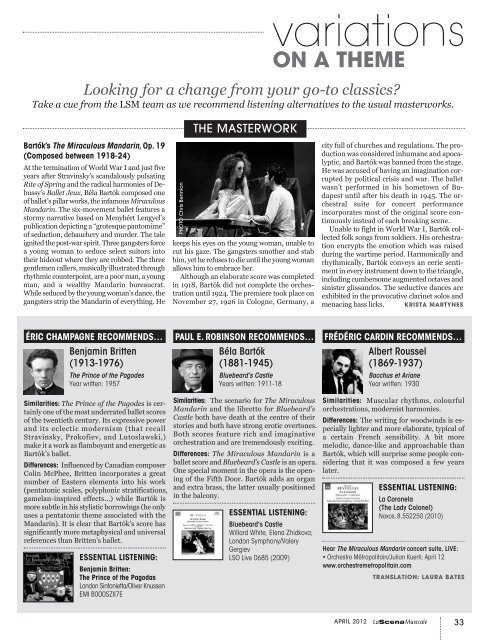The Bohlen-Pierce system - La Scena Musicale
The Bohlen-Pierce system - La Scena Musicale
The Bohlen-Pierce system - La Scena Musicale
You also want an ePaper? Increase the reach of your titles
YUMPU automatically turns print PDFs into web optimized ePapers that Google loves.
variations<br />
ON A THEME<br />
Looking for a change from your go-to classics?<br />
Take a cue from the LSM team as we recommend listening alternatives to the usual masterworks.<br />
Bartók’s <strong>The</strong> Miraculous Mandarin, Op. 19<br />
(Composed between 1918-24)<br />
At the termination of World War I and just five<br />
years after Stravinsky’s scandalously pulsating<br />
Rite of Spring and the radical harmonies of Debussy’s<br />
Ballet Jeux, Béla Bartók composed one<br />
of ballet’s pillar works, the infamous Miraculous<br />
Mandarin. <strong>The</strong> six-movement ballet features a<br />
stormy narrative based on Menyhért Lengyel’s<br />
publication depicting a “grotesque pantomime”<br />
of seduction, debauchery and murder. <strong>The</strong> tale<br />
ignited the post-war spirit. Three gangsters force<br />
a young woman to seduce select suitors into<br />
their hideout where they are robbed. <strong>The</strong> three<br />
gentlemen callers, musically illustrated through<br />
rhythmic counterpoint, are a poor man, a young<br />
man, and a wealthy Mandarin bureaucrat.<br />
While seduced by the young woman’s dance, the<br />
gangsters strip the Mandarin of everything. He<br />
PHOTO Chris Bennion<br />
THE MASTERWORK<br />
keeps his eyes on the young woman, unable to<br />
cut his gaze. <strong>The</strong> gangsters smother and stab<br />
him, yet he refuses to die until the young woman<br />
allows him to embrace her.<br />
Although an elaborate score was completed<br />
in 1918, Bartók did not complete the orchestration<br />
until 1924. <strong>The</strong> premiere took place on<br />
November 27, 1926 in Cologne, Germany, a<br />
city full of churches and regulations. <strong>The</strong> production<br />
was considered inhumane and apocalyptic,<br />
and Bartók was banned from the stage.<br />
He was accused of having an imagination corrupted<br />
by political crisis and war. <strong>The</strong> ballet<br />
wasn’t performed in his hometown of Budapest<br />
until after his death in 1945. <strong>The</strong> orchestral<br />
suite for concert performance<br />
incorporates most of the original score continuously<br />
instead of each breaking scene.<br />
Unable to fight in World War I, Bartók collected<br />
folk songs from soldiers. His orchestration<br />
encrypts the emotion which was raised<br />
during the wartime period. Harmonically and<br />
rhythmically, Bartók conveys an eerie sentiment<br />
in every instrument down to the triangle,<br />
including cumbersome augmented octaves and<br />
sinister glissandos. <strong>The</strong> seductive dances are<br />
exhibited in the provocative clarinet solos and<br />
menacing bass licks. KRISTA MARTYNES<br />
ÉRIC CHAMPAGNE RECOMMENDS…<br />
Benjamin Britten<br />
(1913-1976)<br />
<strong>The</strong> Prince of the Pagodes<br />
Year written: 1957<br />
PAUL E. ROBINSON RECOMMENDS…<br />
Béla Bartók<br />
(1881-1945)<br />
Bluebeard’s Castle<br />
Years written: 1911-18<br />
FRÉDÉRIC CARDIN RECOMMENDS…<br />
Albert Roussel<br />
(1869-1937)<br />
Bacchus et Ariane<br />
Year written: 1930<br />
Similarities: <strong>The</strong> Prince of the Pagodes is certainly<br />
one of the most underrated ballet scores<br />
of the twentieth century. Its expressive power<br />
and its eclectic modernism (that recall<br />
Stravinsky, Prokofiev, and Lutoslawski,)<br />
make it a work as flamboyant and energetic as<br />
Bartók’s ballet.<br />
Differences: Influenced by Canadian composer<br />
Colin McPhee, Britten incorporates a great<br />
number of Eastern elements into his work<br />
(pentatonic scales, polyphonic stratifications,<br />
gamelan-inspired effects...) while Bartók is<br />
more subtle in his stylistic borrowings (he only<br />
uses a pentatonic theme associated with the<br />
Mandarin). It is clear that Bartók’s score has<br />
significantly more metaphysical and universal<br />
references than Britten’s ballet.<br />
ESSENTIAL LISTENING:<br />
Benjamin Britten:<br />
<strong>The</strong> Prince of the Pagodas<br />
London Sinfonietta/Oliver Knussen<br />
EMI B000SZII7E<br />
Similarities: <strong>The</strong> scenario for <strong>The</strong> Miraculous<br />
Mandarin and the libretto for Bluebeard’s<br />
Castle both have death at the centre of their<br />
stories and both have strong erotic overtones.<br />
Both scores feature rich and imaginative<br />
orchestration and are tremendously exciting.<br />
Differences: <strong>The</strong> Miraculous Mandarin is a<br />
ballet score and Bluebeard’s Castle is an opera.<br />
One special moment in the opera is the opening<br />
of the Fifth Door. Bartók adds an organ<br />
and extra brass, the latter usually positioned<br />
in the balcony.<br />
ESSENTIAL LISTENING:<br />
Bluebeard’s Castle<br />
Willard White, Elena Zhidkova;<br />
London Symphony/Valery<br />
Gergiev<br />
LSO Live 0685 (2009)<br />
Similarities: Muscular rhythms, colourful<br />
orchestrations, modernist harmonies.<br />
Differences: <strong>The</strong> writing for woodwinds is especially<br />
lighter and more elaborate, typical of<br />
a certain French sensibility. A bit more<br />
melodic, dance-like and approachable than<br />
Bartók, which will surprise some people considering<br />
that it was composed a few years<br />
later.<br />
ESSENTIAL LISTENING:<br />
<strong>La</strong> Coronela<br />
(<strong>The</strong> <strong>La</strong>dy Colonel)<br />
Naxos, 8.552250 (2010)<br />
Hear <strong>The</strong> Miraculous Mandarin concert suite, LIVE:<br />
• Orchestre Métropolitain/Julian Kuerti; April 12<br />
www.orchestremetropolitain.com<br />
TRANSLATION: LAURA BATES<br />
APRIL 2012 33

















